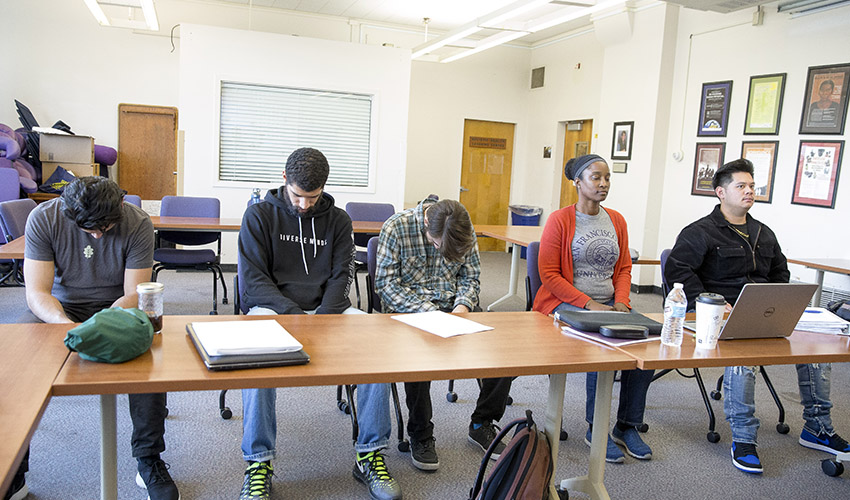Good posture is important for physical and mental health

Students in the Department of Health Education participate in a posture experiment.
Professor finds that slouching can increase negative thinking
If you are low on energy or feeling hopeless, helpless, powerless or defeated: don’t slump! As part of a study published recently in the journal Biofeedback, San Francisco State University Professor of Health Education Erik Peper and three colleagues asked 216 students to first sit in a slouched position, then to sit upright, with shoulders pulled down and back and a slight arch in the back.
While the students were slumped, the researchers asked them to try to recall negative memories and then, in a second step, positive memories. They then asked the students to repeat the same experiments while sitting upright. Eighty-six percent of the students reported that it was much easier to recall negative memories in the slumped position. Eighty-seven percent found it easier to remember positive things while sitting with erect (tall) posture. Peper and his colleagues’ findings have implications for students, people in therapy being treated for depression, those with back and neck pain, public speakers and anyone who simply wants to feel better.
“When you look down, you have easier access to the more hopeless, self-defeating thoughts,” said Peper. Being slumped or hunched over, Peper explains, is a defensive, powerless position. “For a student, that probably means that when you are trying to perform on an exam, you will perform slightly worse. It’s harder to do clear, abstract thinking when your body is defending itself against danger.”
People with a fear of public speaking or who are under stress at the office can also reduce their anxiety and improve their moods by practicing better posture, according to Peper. “When you feel defeated, you tend to collapse,” he said. “If you put yourself in an upward position, you have more power and more willingness to do a task. Also, other people react to you differently.”
Peper is worried that hunching over to look at cell phones — “text neck” — may be causing more anxiety and depression both in students and the general population. “If you have a history or familiarity with defeat, powerlessness, or depressive history or events, then this slouched position encourages more hopeless thinking,” he said.
But, he added, “You can take charge of yourself. Put yourself in an empowering, upright positon. Remember that our thoughts and emotions are represented in our bodies. And vice versa: Our bodies can change our thoughts.”
Other authors on the study include I-Mei Lin of Kaohsiung Medical University, SF State Associate Professor of Health Education Richard Harvey, and Jacob Perez, a former teaching assistant for Peper and Harvey who has since graduated.